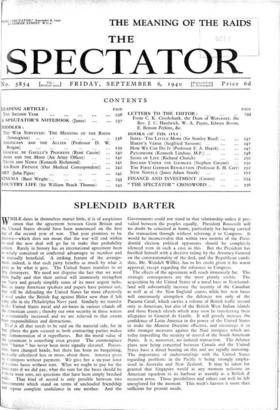SPLENDID BARTER
WHILE dates in themselves matter little, it is of auspicious omen that the agreement between Great Britain and the United States should have been announced on the first day of the second year of war. That year promises to be decisive—which does not mean that the war will end within it—and the new deal will go far to make that probability certain. Rarely in history has an international agreement been so wisely conceived or conferred advantages so manifest and SO mutually beneficial. A striking feature of the arrange- ment, indeed, is that each party benefits as much by what it gives as by what it gets. The United States transfers to us fifty destroyers. We need not disguise the fact that we need them badly and that their arrival will immensely strengthen Our Navy and greatly simplify some of its most urgent tasks. But, as many American speakers and papers have pointed out, they will be defending the United States far more effectively sfused under the British flag against Hitler now than if left lying idle in the Philadelphia Navy yard. Similarly we transfer to thz United States naval and air-bases in various islands off the American coasts ; thereby our own security in those waters Is substantially increased and we are relieved to that extent from responsibilities and distractions. That is all that needs to be said on the material side, for in that sphere the gain secured to both contracting parties makes any demonstration of it superfluous. But the moral value of the agreement is something even greater The commonplace term " barter " has never been more signally elevated. Posses- sions have changed hands, but there has been no bargaining, DO nicely calculated less or more, about them. America gives Us destroyers without payment. We give her a 99-year lease Of various bases without rent. What we ought to pay for the destroyers if we did pay, what the rent for the bases should be if there were rent, are questions that have been simply brushed That kind of accord is only possible between two Governments which stand on terms of unclouded friendship and repose complete confidence in one another. And the Governments could not stand in that relationship unless it pre- vailed between the peoples equally. President Roosevelt will no doubt be criticised at home, particularly for having carried the transaction through without referring it to Congress. It would be inconceivable that within two months of the Presi- dential election political opponents should be completely silenced even in such a case as this. But the President has fortified himself with a decisive ruling by the Attorney-General on the constitutionality of the deal, and the Republican candi- date, Mr. Wendell Willkie, has to his credit given it his warm approval, except regarding the reference to Congress.
The effects of the agreement will reach immensely far. The strategic consequences are the most plainly visible. The acquisition by the United States of a naval base in Newfound- land will substantially increase the security of the Canadian as well as of the New England coasts, while her new bases will enormously strengthen the defences not only of the Panama Canal, which carries a volume of British traffic second only to American, but also of the British West Indian islands and those French islands which may soon be transferring their allegiance to General de Gaulle. It will greatly increase the confidence of Latin America in the power of the United States to make the Monroe Doctrine effective, and encourage it to take stronger measures against the Nazi intrigues which are today imperilling the security of several of the South American States. It is, moreover, no isolated transaction. The defence plans now being concerted between Canada and the United States have a direct bearing on this and are rapidly maturing. The importance of understandings with the United States regarding problems in the Pacific is being strongly empha- sised in Australia and New Zealand. It may be taken for granted that Singapore would at any moment welcome an American squadron to its harbour as warmly as a British if occasion arose. Those possibilities and others can well be left unexplored for the moment. This week's harvest is more than sufficient for present needs.


























